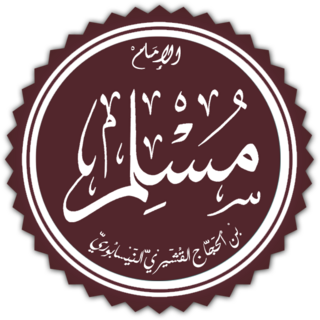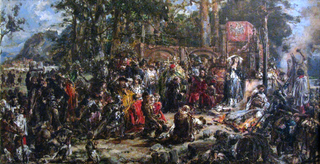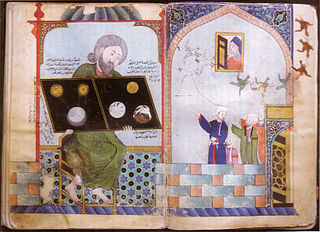
Ibn Sina, commonly known in the West as Avicenna, was a Persian polymath who is regarded as one of the most significant physicians, astronomers, philosophers, and writers of the Islamic Golden Age, and the father of early modern medicine. Sajjad H. Rizvi has called Avicenna "arguably the most influential philosopher of the pre-modern era". He was a Muslim Peripatetic philosopher influenced by Greek Aristotelian philosophy. Of the 450 works he is believed to have written, around 240 have survived, including 150 on philosophy and 40 on medicine.

Abū Mūsā Jābir ibn Ḥayyān, died c. 806−816, is the purported author of an enormous number and variety of works in Arabic, often called the Jabirian corpus. The works that survive today mainly deal with alchemy and chemistry, magic, and Shi'ite religious philosophy. However, the original scope of the corpus was vast and diverse, covering a wide range of topics ranging from cosmology, astronomy and astrology, over medicine, pharmacology, zoology and botany, to metaphysics, logic, and grammar.

The House of Wisdom, also known as the Grand Library of Baghdad, refers to either a major Abbasid public academy and intellectual center in Baghdad or to a large private library belonging to the Abbasid caliphs during the Islamic Golden Age. The House of Wisdom was founded either as a library for the collections of the Caliph Harun al-Rashid in the late 8th century or was a private collection created by al-Mansur to house rare books and collections of poetry in Arabic.
Ahmad ibn Rustah Isfahani, more commonly known as Ibn Rustah, was a tenth-century Persian explorer and geographer born in Rosta district, Isfahan, Persia. He wrote a geographical compendium known as Kitāb al-A‘lāq al-Nafīsa. The information on his home town of Isfahan is especially extensive and valuable. Ibn Rustah states that, while for other lands he had to depend on second-hand reports, often acquired with great difficulty and with no means of checking their veracity, for Isfahan he could use his own experience and observations or statements from others known to be reliable. Thus we have a description of the twenty districts (rostaqs) of Isfahan containing details not found in other geographers' works. Concerning the town itself, we learn that it was perfectly circular in shape, with a circumference of half a farsang, walls defended by a hundred towers, and four gates.

Abū Muhammad ʿAbd Allāh Rūzbih ibn Dādūya, born Rōzbih pūr-i Dādōē, more commonly known as Ibn al-Muqaffaʿ, , was a Persian translator, philosopher, author and thinker who wrote in the Arabic language.

Abū al-ʿAbbās Aḥmad ibn Muḥammad ibn Kathīr al-Farghānī, also known as Alfraganus in the West, was an astronomer in the Abbasid court in Baghdad, and one of the most famous astronomers in the 9th century. Al-Farghani composed several works on astronomy and astronomical equipment that were widely distributed in Arabic and Latin and were influential to many scientists. His best known work, Kitāb fī Jawāmiʿ ʿIlm al-Nujūmi, was an extensive summary of Ptolemy's Almagest containing revised experimental data. Christopher Columbus, used Al Farghani’s calculations for his voyages to America. In addition to making substantial contributions to astronomy, al-Farghani also worked as an engineer, supervising construction projects on rivers in Cairo, Egypt. The lunar crater Alfraganus is named after him.
Muḥammad ibn Mūsā al-Khwārizmī, or al-Khwarizmi was a Persian polymath from Khwarazm, who produced vastly influential works in mathematics, astronomy, and geography. Around 820 CE, he was appointed as the astronomer and head of the library of the House of Wisdom in Baghdad.

Abū al-Ḥusayn ‘Asākir ad-Dīn Muslim ibn al-Ḥajjāj ibn Muslim ibn Ward ibn Kawshādh al-Qushayrī an-Naysābūrī or Muslim Nayshāpūrī, commonly known as Imam Muslim, was an Islamic scholar from the city of Nishapur, particularly known as a muhaddith. His hadith collection, known as Sahih Muslim, is one of the six major hadith collections in Sunni Islam and is regarded as one of the two most authentic (sahih) collections, alongside Sahih al-Bukhari.

Abu Ma'shar al-Balkhi, Latinized as Albumasar, was an early Persian Muslim astrologer, thought to be the greatest astrologer of the Abbasid court in Baghdad. While he was not a major innovator, his practical manuals for training astrologers profoundly influenced Muslim intellectual history and, through translations, that of western Europe and Byzantium.

Yuhanna ibn Masawaih, , also written Ibn Masawaih, Masawaiyh, and in Latin Janus Damascenus, or Mesue, Masuya, Mesue Major, Msuya, and Mesuë the Elder was a Persian or Assyrian East Syriac Christian physician from the Academy of Gundishapur. According to The Canon of Medicine for Avicenna and 'Uyun al-Anba for the medieval Arabic historian Ibn Abi Usaybi'a, Masawaiyh's father was Assyrian and his mother was Slavic.

In the history of medicine, "Islamic medicine" is the science of medicine developed in the Middle East, and usually written in Arabic, the lingua franca of Islamic civilization.

William C. Chittick is an American philosopher, writer, translator and interpreter of classical Islamic philosophical and mystical texts. He is best known for his work on Rumi and Ibn 'Arabi, and has written extensively on the school of Ibn 'Arabi, Islamic philosophy, and Islamic cosmology.

Islamic literature is literature written by Muslim people, influenced by an Islamic cultural perspective, or literature that portrays Islam. It can be written in any language and portray any country or region. It includes many literary forms including adabs, a non-fiction form of Islamic advice literature, and various fictional literary genres.

Abu Ishaq Ibrahim ibn Muhammad al-Farisi al-Istakhri was a 10th-century travel-author and geographer who wrote valuable accounts in Arabic of the many Muslim territories he visited during the Abbasid era of the Islamic Golden Age. There is no consensus regarding his origin. Some sources describe him as Persian, while others state he was Arab. The Encyclopedia Iranica states: "Biographical data are very meager. From his nesbas he appears to have been a native of Eṣṭaḵr in Fārs, but it is not known whether he was Persian".
Khālid ibn Yazīd, c. 668–704 or 709, was an Umayyad prince and purported alchemist.

Abu Ali Yahya ibn Isa ibn Jazla al-Baghdadi or Ibn Jazlah, Latinized as Buhahylyha Bingezla, was an 11th-century Arab physician of Baghdad and author of an influential treatise on regimen that was translated into Latin in 1280 AD by the Sicilian Jewish physician Faraj ben Salem.

The transmission of the Greek Classics to Latin Western Europe during the Middle Ages was a key factor in the development of intellectual life in Western Europe. Interest in Greek texts and their availability was scarce in the Latin West during the Early Middle Ages, but as traffic to the East increased, so did Western scholarship.

During the High Middle Ages, the Islamic world was at its cultural peak, supplying information and ideas to Europe, via Al-Andalus, Sicily and the Crusader kingdoms in the Levant. These included Latin translations of the Greek Classics and of Arabic texts in astronomy, mathematics, science, and medicine. Translation of Arabic philosophical texts into Latin "led to the transformation of almost all philosophical disciplines in the medieval Latin world", with a particularly strong influence of Muslim philosophers being felt in natural philosophy, psychology and metaphysics. Other contributions included technological and scientific innovations via the Silk Road, including Chinese inventions such as paper and gunpowder.

Alchemy in the medieval Islamic world refers to both traditional alchemy and early practical chemistry by Muslim scholars in the medieval Islamic world. The word alchemy was derived from the Arabic word كيمياء or kīmiyāʾ and may ultimately derive from the ancient Egyptian word kemi, meaning black.

Abu Muhammad Shihab al-Din Ahmad ibn Muhammad ibn Abd Allah ibn Ibrahim also known as Muhammad ibn Arabshah (1389–1450), was an Arab writer and traveller who lived under the reign of Timur (1370–1405).

















